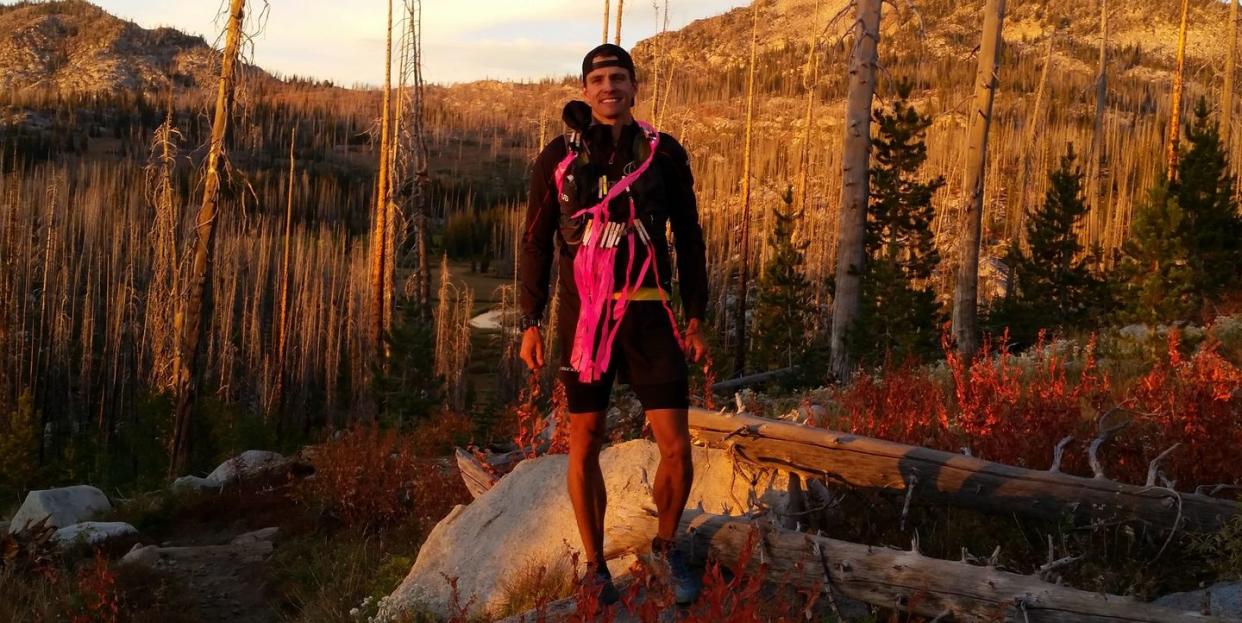Ultrarunner Finds Woman Who Was Missing in Idaho Wilderness For a Week

On the night of July 9, Jeremy Humphrey, 41, of McCall, Idaho, learned that a woman and her dog, whose names we omitted due to privacy reasons, had been missing for a week in the nearby Valley County wilderness.
So the following morning, Humphrey, an ultrarunner, called the Valley County Sheriff’s office—which had deployed its search and rescue unit—to notify them that he would help out. He was familiar with the area after years of running, hiking, climbing, hunting, and race directing ultras in those woods, so he figured he could put his expertise and running abilities to good use.
“I just had this strange, maybe spiritual, feeling from the moment I heard about it that I could see the entire thing and how it would play out if I went out,” he said. “I’ve been in the mountains my whole life, and I’ve helped search and rescue before. I lost my dad and his twin brother when they fell climbing Denali. The mountains have given a lot to me and taken a lot from me, and some energy told me I had to do this.”
With the lack of races due to the coronavirus pandemic, Humphrey has been focusing on just running as long and as far as his heart desired. “I’m usually training for 100-mile fitness,” he told Runner’s World. “With everything canceled, I’m out of my regimen and just running big stuff, lots of adventure runs. I haven’t run less than six hours in a long time.”
Those long hours spent running prepared him for the search. After hearing the details of the case—no one knew the woman was missing until a few days after she had gotten lost because she hadn’t told many people she was going out—Humphrey thought about the area around the trailhead where her car was located. He also relied heavily on the detail that she liked lakes, many of which lie off the trail there. He packed enough fuel for running upwards of 40 miles and set out to find the lost woman.
He knew the search-and-rescue team was in the northern section near her car, so he started from the southern rim. With three teams already looking for her, he knew he should avoid the obvious places. Lake by lake, section by section, he moved slowly and called out the woman’s name without response.
He kept climbing to higher vantage points to get a better perspective, and used binoculars to scan the area. Doing this required going over a blowdown—an area with many fallen trees caused by an old wildfire 20 years ago—which required him to climb over or crawl under many downed fir and spruce trees.
Around 20 miles into his search, he had to start planning out his next moves carefully. He planned for 40 miles, so he’d have to turn back soon if he was going to make it back home as intended. He decided to check out a couple more lakes and before starting the trek back.
After spending nearly all of daylight on the trail, about 10 hours and 23 to 25 miles on foot, he finally heard a response in the early evening.
“I’m calling out, and it shocked me, I heard a female voice call back though I couldn’t see her,” he said. “I could sense the direction, so I cross this drainage, a little dip in the topography. I’m jumping over rocks and logs, and I see someone, and again when I’m about 300 yards away, that’s when I see her dog, so that’s a good sign. My adrenaline is up as I’m bounding down this hill, full sprint until I finally reach her.”
Aside from injuries sustained by exposure to the sun, the woman was otherwise okay. She immediately told Humphrey that she had been drinking from the marshy lake next to where she had set up camp while she was lost and had not eaten in four-plus days. So while Humphrey called the Sheriff’s office, he dumped his pack out and let the woman and her dog have the energy bars and electrolyte drink he had brought with him.
“She’s super tough,” Humphrey said. “She just wanted to eat pizza and ice cream.”
Once the woman, her dog, and her 60-pound pack were airlifted out of the area (she refused hospital care), Humphrey drove her car an hour back to the local fire department, where his wife met him with food and drinks.
Humphrey has talked to the woman since, and she is recovering well from her injuries. He now plans to continue his adventure running before winter storms arrive.
“Normally, running is super selfish and fueled by the desire to be a champion,” Humphrey said. “All these years of doing that, I feel like I had a skill set that made it possible to help someone else, and that feels good. It feels not so selfish.”
You Might Also Like
